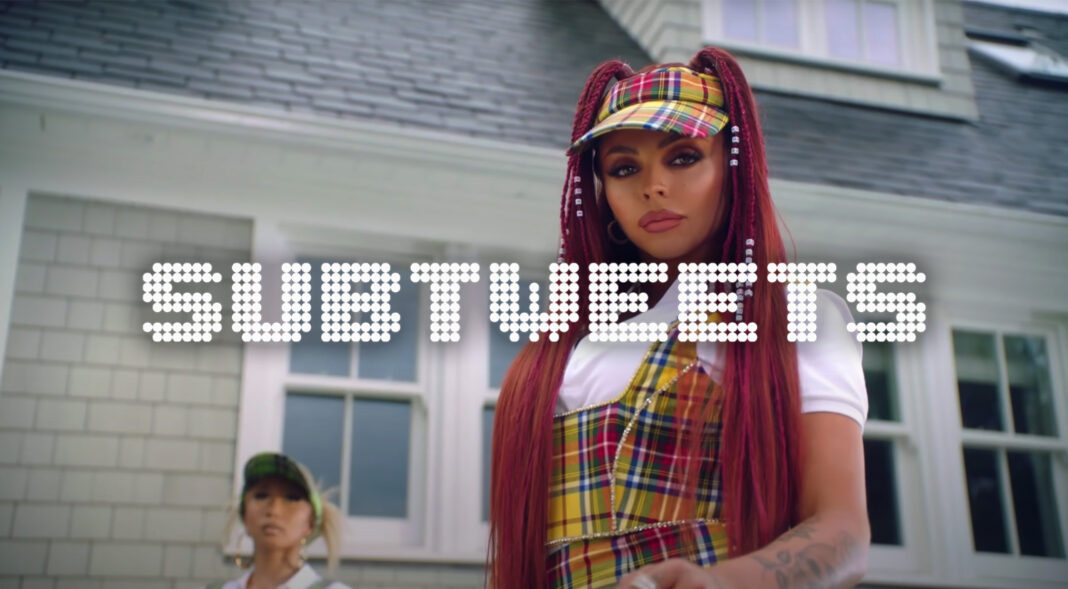Though it was nearly a year ago, Jesy Nelson’s decision to leave Little Mix on the grounds of poor mental health remains nothing short of revolutionary. A rare move of open no-nonsense autonomy in pop, she cemented the notion that one can and must fight for their own sense of self and gave fans the thrill that new material might be something of similar honesty and ownership.
When ‘Boyz’ finally arrived last week, it would be putting it mildly to say that the overall response wasn’t kind. Built around an interpolation of P. Diddy’s 2001 classic ‘Bad Boy For Life’, the catchy nature and massive budget of ‘Boyz’ sees Nelson looking more relaxed than before, embracing her much-discussed lifelong love of RnB with the sort of carefree playfulness that she has told interviewers she never dreamed she could have. But within minutes of its YouTube debut, fans and pop commentators alike were questioning Jesy’s singing ‘Blaccent’ (which seems to skip between Americanised baby-girl vocals and slurred Jamaican vowels) as well as the shade of her skin tone, deeper in some shots than that of her collaborator, Nicki Minaj.
In her efforts to recreate P. Diddy’s video, we are met with grills, braids, and hulking black men, illustrating Nelson’s desire for a bad, bad boy. Unlike the witty race-relations satire of the original video, the only thing that remains firmly in-cheek is Nelson’s lollipop, watching on smugly as the white neighbourhood gets taken over by the new ‘ghetto’ residents; “so good, so hood, so damn taboo.” White men do appear in the video, but the camera lingers mostly on aesthetics borrowed specifically from Black culture, inherently linking ‘badness’ with blackness for the purposes of the song. By the time you get to Minaj’s verse – an artist whose recent personal and professional associations would suggest that her idea of a bad boy is less someone who doesn’t text you back and more somebody who has credibly been accused of sexual abuse – and you have yourself a particularly good example of failing to read the room.
Released, somewhat ironically, in Black History Month, ‘Boyz’ is not only culturally insensitive but a depressingly familiar reminder that we have seen this all before. Though often referred to as ‘blackfishing’, ‘mixed-fishing’ often feels more accurate; a kind of fetishisation or ambiguous ‘exoticism’ that is achieved through dark tanning and ‘hip-hop’ styling, trying on cultures without addressing the risks, scrutiny or vulnerabilities that a person of colour might have to face. Whether it’s Ariana Grande’s tan, Katy Perry’s Egyptian outfits or Miley Cyrus’s twerkathon, Black and indigenous cultures are frequently adopted as tools for the young white female star trying to show off her ‘rebel side’, worn like a trend before moving on to more wholesome things. In the early noughties, it was rife; Christina Aguilera’s blonde braids, Gwen Stefani’s open pillaging of both Harajuku and African-American fashion, numerous artists dalliances with bhangra and traditional Indian aesthetics. Meanwhile, black artists like Nelson’s very own ex-bandmate Leigh-Ann Pinnock are left to make documentaries about the lack of support for their own musical truth, unable to fall back on white privilege when a trend expires. Pointing out the flaws in ‘Boyz’ does not mean casting aspersions on Jesy’s seemingly genuine love of the genre or suggesting that white artists should never make RnB, but rather questioning how Nelson – and many others before her – choose to centre themselves within the rhythm without also sharing in the blues.
Negative responses to the video may well have blown over with time, but the subsequent speaking appearances that Jesy has made only seem to have made things worse. An in-depth interview with Variety saw Nelson shrugging off any criticisms of blackfishing by insisting that it was not something she had been made aware of, before the penny-drop of the growing Twitter shitstorm brought about an Instagram live session with Nicki Minaj to address the song’s release. Save for some feeble protestations about how dark her skin naturally goes on holiday, Nelson let Minaj do most of the talking, an awkward smirk and laugh appearing on her face when Minaj begins to accuse Nelson’s ex-bandmate Leigh-Ann Pinnock of badmouthing the song in an act of jealousy (stemming from alleged screenshots of Leigh-Anne’s Instagram stories, which haven’t been verified as genuine).
Reminiscent of the kind of cattiness normally reserved for high school, this clear deflection from the actual misstep at hand feels ugly for Little Mix fans to have to see, especially given Nelson’s firsthand experience of the impact of bullying and the fact that Pinnock, the only Black member of the band, has spoken at some length about how Black girl band members are so often wrongfully blamed as the core source of aggression or inter-band drama. Minaj herself had no problem calling out Miley Cyrus amid a row about cultural appropriation but seems to revel in the idea of stirring tensions within a group, fuelling fans frustrations over her repeated lack of Black female allyship.
The distinct lack of good grace or even knowing satire is a big part of why ‘Boyz’ was doomed to fail. The original ‘Bad Boy For Life’ worked because P. Diddy WAS the moral panic in a white suburban neighbourhood, invoking deadpan humour as a pre-Karen-era Ben Stiller tried to speak the lingo in order to get his new ‘homeboy’ to turn down the volume. Without any of this inside expertise or positioning, ‘Boyz’ misses out on any of the relevant social commentary, a straight pastiche without the punchline. Though initially intended as a homage to a beloved era of pop iconography, it lacks the grandeur of something like Normani’s endearing ‘Motivation’ vid, which worked specifically because of its ability to reimagine old classics through an often-marginalised lens. With such an obvious budget to play with, it’s disappointing that Jesy’s big comeback couldn’t have been something more nuanced, maybe even an active interrogation of these tired ‘bad boy’ tropes.
As Black Twitter tends to find ways to do, many fans have managed to have some fun with the ‘Boyz’ furore. A thread is currently doing the rounds of people’s favourite’ cultural appropriative bops, while others have amused themselves by imagining the kind of bad boy that Nelson might have encountered in her native Romford, more Slug & Lettuce than legitimate hood. But throughout this ‘if you don’t laugh you’ll cry’ stoicism, there is no changing the fact that for Black people, this ‘who, me?’ reaction of slow-blinking innocence is cumulatively exhausting to see. Nelson is not the only person to used Black aesthetics as a trend, but from her 30-year-old-self right through to her management, there are so many people in the song’s creation who could have and should have known better, or at least seen fit to seek counsel from those with some lived experience or sensitivity.
Perhaps it’s understandable why she might have chosen to stay quiet. Throughout her years in Little Mix, she was failed time and time again by vicious judgements and unwarranted jibes, her mental health depleting to the point where she had to disengage entirely for her own preservation. It was brutal and deeply undeserved, the sort of thing that builds fortresses of insecurity and self-defence. But when a person’s walls go up that far, they also risk becoming unable to distinguish between the threat of needless hatred and a genuine request for accountable growth. Nelson has the intelligence and mobility to address these blackfishing claims head-on but has so far chosen to abdicate responsibility under the guise of self-care. In the Instagram Live, she spoke of her confusion and frustration that the idea of blackfishing hadn’t been introduced to her until the set of Little Mix’s 2020 video ‘Sweet Melody’, but doesn’t seem to have asked herself how she managed to exist in a girl group with two women of colour for nine years without learning anything about how racism and fetishisation stigmatize the everyday lived experiences of non-white folk. By refusing to acknowledge the part she has played in perpetuating lazy stereotypes – not to mention shifting blame upon her ex-bandmate – she risks falling so far into victimisation that she forgets her own power to victimise others.
Constructively criticising Nelson’s choices of late should not be mistaken as wishing for her cancellation or damning her entire career. Nothing can be achieved from squarely attributing blame upon one woman for a problem that is perpetuated and upheld by so many. But what it should be is an opportunity for us all to remember that in the aftermath of 2020’s Black Lives Matter resurgence especially, ignorance is no longer a fair claim of innocence when it comes to race. Nelson’s decision to go it alone in music is a move that can never be taken away from her; an emblem of real strength, power and inspiration to her young fanbase of the need to follow your truth. But if ‘Boyz’ is the version of herself that she truly claims she wanted to find, she might need to think a little harder about how she uses her voice.
Every week, Jenessa Williams unpacks the biggest topics setting Music Twitter alight. Dive into even more Subtweets in her weekly column.







